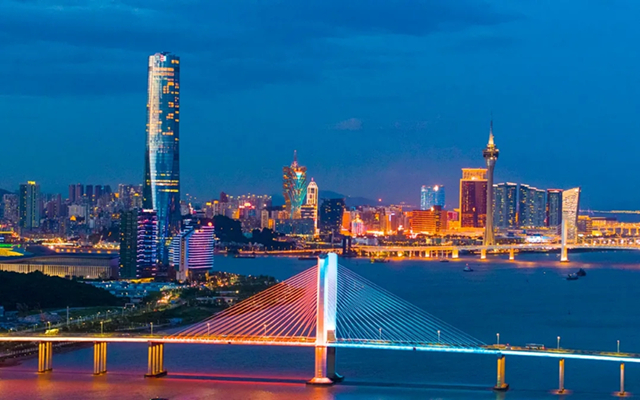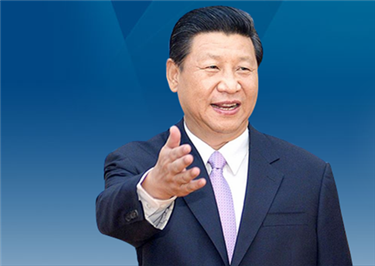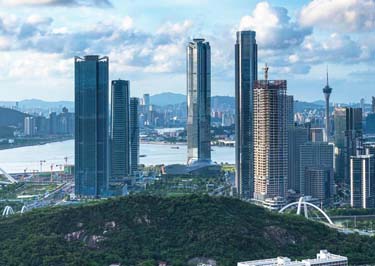CPC empowers Zhuhai with pivotal future in Greater Bay
Four decades of pioneering reform and socioeconomic development under the strong leadership of the Communist Party of China have placed Zhuhai on the threshold of becoming a Modernized and Internationalized Special Economic Zone in the New Era of Socialism With Chinese Characteristics.
This can be viewed as a fulcrum for in-depth Guangdong-Hong Kong-Macao cooperation, major regional gateway, geographic node, innovation pioneer, leader in ecological civilization, and model for livelihoods and happiness.
Zhuhai has shouldered an historical mission to spearhead China's Reform & Opening Up and socialist modernization since being designated as a special economic zone in 1980, said Party Chief Guo Yonghang during a recent interview with Nanfang Daily and Nanfang Plus.
Not only is the city the historic site of China's first Sino-foreign joint venture hotel and first enterprise engaged in the processing and compensation trade, but it also took the lead in setting up the basic framework for socialist market economy, offering 12 years of free education, and creating an early urban plan for coordinated economic and ecological development.
Meantime, breakthroughs have been made in reforming the Hengqin Free Trade Zone, State assets and State-owned enterprises, business environment, and regional management system.
A sustainable development path credited now with making Zhuhai one of the Pearl River Delta cities with the most potential, best environment, and most optimal policies for growth.

Prosperous Zhuhai (Shown is the Hengqin Bridge and Shizimen Central Business District against backdrop of the Macao peninsula) [Photo by Li Jianshu / WeChat account: zhuhaifabu]
The city's GDP has increased more than 1,300-fold to 348.19 billion yuan ($53 billion) over the past 41 years, and ranked 6th in the province last year, amid the COVID-19 pandemic. Local General Public Budget revenue rose more than 1,500-fold during the period and surpassed 100 billion yuan ($15 billion) for the first time in 2020.
Zhuhai is ranked 39th globally in economic vibrancy in the Global Urban Competitiveness Report (2020-21), and 5th nationwide in the 18th Report on China's Urban Competitiveness.
In total, 260,000 talents have been attracted to the city since initiation of the Zhuhai Talent Program in 2018, and the talent inflow rate has been at the forefront in the province for three consecutive years. The number of permanent residents increased by 56.36 percent to 2.44 million during the 2010-20 period, a growth rate second only to Shenzhen in the province.
In terms of quality of life, the per capita disposable income of Zhuhai urban-rural residents grew from 1,484 yuan ($229) in 1986 to 55,219 ($8,533) in 2020, and the per capita public service expenditure ranked 2nd in Guangdong.
Moreover, Zhuhai has been helping boost the moderate diversification of Macao's economy. As of now, Hengqin New Area is home to more than 4,000 Macao-funded enterprises, the highest concentration of Macao enterprises in the Chinese mainland.
Hong Kong and Macao tour guides and construction enterprises are allowed cross-border practice in Hengqin, while the increasingly relaxed exit-entry policy of Macao single-plate vehicles and construction of Macao New Neighborhood greatly increase the livelihood convenience.
A regional hub on the west bank of the Pearl River Estuary, Zhuhai has witnessed the opening of the Hong Kong-Zhuhai-Macao Bridge and accelerated construction of the Huangmao Sea Channel Bridge. Passenger volume at Zhuhai (Jinwan) Airport exceeded 10 million, and cargo throughput at Gaolan Port surpassed 100 million tons.
Regionally, Zhuhai has been synergistically developing with the Guangzhou and Shenzhen metropolitan areas. It also allocated 5.7 billion yuan ($881 million) and sent more than 400 officials to help 422,700 people shake off poverty in 109,100 households in western Guangdong, Yunnan, and Tibet.







